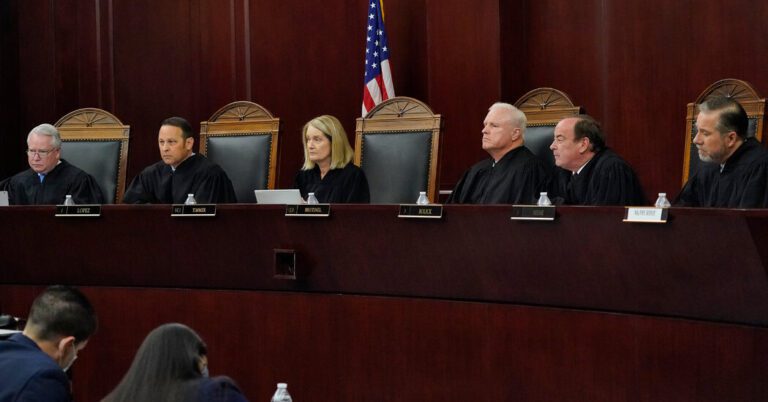
[ad_1]
Arizona’s highest court on Tuesday upheld an 1864 law that bans nearly all abortions, a decision that could have far-reaching consequences for women’s health care and election-year politics in a critical battleground state.
The 1864 law, the court said in a 4-to-2 decision, “is now enforceable.” But the court put its ruling on hold for the moment, and sent the matter back to a lower court to hear additional arguments about the law’s constitutionality.
Because of a 14-day stay and another 45-day delay before enforcement, it will very likely be weeks before the law goes into effect.
The Arizona Supreme Court said that because the federal right to abortion in Roe v. Wade had been overturned, there was no federal or state law preventing Arizona from enforcing the near-total ban on abortions, which had sat dormant for decades.
The ruling could prompt clinics in Arizona to soon stop providing abortions and women to travel to nearby states like California, New Mexico or Colorado to end their pregnancies. Until now, the procedure has been legal in Arizona through 15 weeks of pregnancy.
The ruling concerned a law that was on the books long before Arizona achieved statehood. It outlaws abortion from the moment of conception, except when necessary to save the life of the mother, and it makes no exceptions for rape or incest. Doctors prosecuted under the law could face fines and prison terms of two to five years.
The court’s ruling was a stinging loss for abortion-rights supporters, who said it would put women’s health in jeopardy.
“Millions of Arizonans will soon live under an even more extreme and dangerous abortion ban, which fails to protect women even when their health is at risk or in tragic cases of rape or incest,” President Biden said in a statement. He added the ban was “cruel,” and that it was a result of “the extreme agenda of Republican elected officials who are committed to ripping away women’s freedom.”
Arizona’s attorney general, Kris Mayes, a Democrat, called the ruling “unconscionable and an affront to freedom.” She promised to mount a legal effort to fight off implementation of the law.
“The court has risked the health and lives of Arizonans,” she said in a statement. “Today’s decision to reimpose a law from a time when Arizona wasn’t a state, the Civil War was raging and women couldn’t even vote will go down in history as a stain on our state.”
Anti-abortion groups cheered the ruling.
“Life is a human right, and today’s decision allows the state to respect that right and fully protect life again — just as the Legislature intended,” said Jake Warner, an attorney for the Alliance Defending Freedom, a conservative Christian advocacy group that argued to reinstate the near-total ban. “We celebrate the Arizona Supreme Court’s decision that allows the state’s pro-life law to again protect the lives of countless, innocent, unborn children.”
But several Arizona Republicans, sensing political peril, joined Democrats in criticizing the ruling and called for the Legislature to repeal it. Republicans control both chambers of the Legislature. The governor, Katie Hobbs, is a first-term Democrat who campaigned on supporting abortion rights.
State Senator T.J. Shope, a Republican who represents a suburban and rural area south of Phoenix, said he would work to repeal the 1864 ban but leave in place a 15-week prohibition on abortions that was passed two years ago and signed into law by the previous governor, Doug Ducey, a Republican.
The stakes could also be significant for races up and down the ballot in Arizona this fall, after former President Donald J. Trump said this week that he thought abortion rights should be left up to the states to decide.
Democrats, who seized on abortion to win campaigns for governor and attorney general in midterm elections two years ago, said it would galvanize their supporters, who were already pushing for a state constitutional right to abortion as a ballot initiative in November. In other states where abortion has been at risk of being curtailed, voters have turned out in force to protect it.
Representative Ruben Gallego, running unopposed in the Democratic primary for Senate, criticized the ruling and tied it to his opponent, Kari Lake, who called the near-total ban a “great law” when she was running for governor in 2022.
“Yet again, extremist politicians like Kari Lake are forcing themselves into doctors’ offices and ripping away the right for women to make their own health care decisions,” Mr. Gallego said, adding that he would do “whatever it takes to protect abortion rights at the federal level.”
Ms. Lake has been emblematic of a Republican shift on abortion. She now opposes a federal ban while still backing the 15-week restriction that was in effect in Arizona, and she said on Tuesday that it was “abundantly clear that the pre-statehood law is out of step with Arizonans.” Ms. Lake called on the Legislature and Ms. Hobbs, her 2022 opponent in the governors race, to “come up with an immediate common sense solution.”
For nearly two years, supporters and opponents of abortion rights in Arizona have been fighting in court over whether the 1864 law could still be enforced, or whether it had been effectively overtaken and neutered by decades of other state laws that regulate and restrict abortion but stop short of banning it entirely.
The 1864 ban had sat mothballed for decades, one of several sweeping state abortion-ban laws that were moribund while Roe v. Wade was in effect but became the focus of intense political and legal action after Roe fell.
Abortions in Wisconsin were largely halted because of an 1849 ban, but resumed last September after a judge said the law did not make abortions illegal. In Michigan, Gov. Gretchen Whitmer, a Democrat, signed a repeal of a 1931 ban on abortion last spring after voters added abortion-rights protections to the state constitution.
[ad_2]